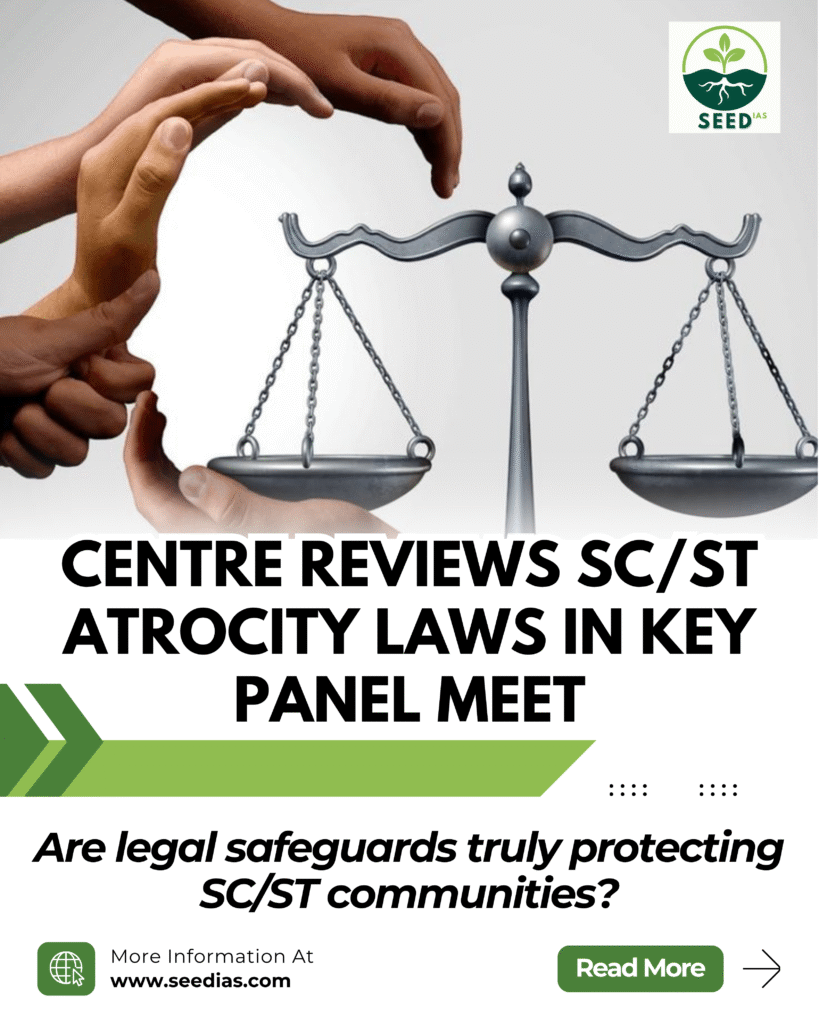Why in NEWS
The Ministry of Social Justice and Empowerment convened the 28th Coordination Committee to review strategies addressing untouchability and atrocities against Scheduled Castes (SCs) and Scheduled Tribes (STs), focusing on enforcement of key legal frameworks like the PCR Act, 1955, and the PoA Act, 1989.
Key Terms & Legal Definitions
| Term | Description |
|---|---|
| Scheduled Castes (SCs) | Defined under Article 366; notified under Article 341 by the President in consultation with the Governor. |
| Scheduled Tribes (STs) | Defined under Article 366; notified under Article 342 by the President in consultation with the Governor. |
| PCR Act, 1955 | Originally the Untouchability (Offences) Act; renamed in 1976 to criminalize untouchability. |
| PoA Act, 1989 | A special law to prevent atrocities against SC/ST communities and ensure speedy justice through Special Courts. |
Current Legal and Institutional Framework
| Provision | Description |
|---|---|
| Article 14, 15, 16, 17 | Ensure equality, prohibit discrimination, and abolish untouchability. |
| Article 46 | Directs State to promote SCs/STs’ educational and economic interests. |
| Article 338 | Provides for National Commission for SCs to monitor safeguards. |
| PoA Amendment Act, 2015 | Broadened definition of atrocities to include sexual violence against SC/ST women. |
| Manual Scavenging Act, 2013 | Prohibits manual scavenging, promotes rehabilitation. |
Major Issues Affecting SC/ST Communities
| Challenge | Key Insights |
|---|---|
| Economic Marginalization | 34% of SCs below poverty line; land alienation, bonded labour, wage issues. |
| Social Discrimination | Prevalent in northern states; 97.7% of atrocities reported in 13 states in 2022. |
| Weak Legal Implementation | Only 194 out of 498 atrocity-prone districts have special courts. |
| Political Assertion vs Dominance | Political empowerment triggering tensions with dominant castes. |
| Systemic Failures | Poor implementation of NAMASTE, PMAGY, SHRESHTA schemes; fund delays and surrenders. |
| Policing & Protection Gaps | Only 5 states have dedicated SC/ST police stations; lack of protection cells. |
Measures to Improve SC/ST Welfare
| Domain | Suggested Reforms |
|---|---|
| Legal & Judicial | Strengthen special courts, ensure time-bound trials, train officials, set up helplines. |
| Police Reforms | Sensitization training, digital complaint portals, district-level atrocity dashboards. |
| Economic Empowerment | Accelerate FRA implementation, expand PM-DAKSH, ensure procurement quotas. |
| Education & Awareness | Scale EMRS, introduce anti-caste curriculum, launch awareness campaigns. |
| Governance | Performance-based central funding, annual audits, empower commissions with suo motu powers. |
In a Nutshell (Memory Code: SEED-P)
Special Courts strengthened
Economic inclusion
Education reforms
Digital monitoring
Political accountability
Prelims Practice Questions
- Which constitutional article abolishes untouchability?
A) Article 14
B) Article 15
C) Article 17
D) Article 19 - The PoA Act, 1989 provides for:
A) Equal property rights to SCs
B) Quotas in private sector
C) Special courts for speedy trial of atrocities
D) Education loans to SC/ST students - Which state has NOT established a special police station for SC/ST offences?
A) Kerala
B) Madhya Pradesh
C) Tamil Nadu
D) Chhattisgarh
Mains Practice Questions
- GS2 (Polity): Examine the effectiveness of legislative and institutional mechanisms in addressing atrocities against Scheduled Castes and Scheduled Tribes in India.
- GS1/GS2: Discuss the role of political empowerment and economic upliftment in reducing caste-based discrimination in India.
Answers with Explanation
| Ques | Answer | Explanation |
|---|---|---|
| 1 | C | Article 17 abolishes untouchability and makes it a punishable offence. |
| 2 | C | The PoA Act mandates special courts for speedy trial of SC/ST atrocity cases. |
| 3 | C | Tamil Nadu is not listed among the five states that have special police stations for SC/ST complaints. |
Tools












